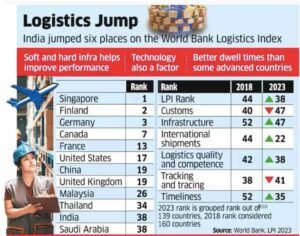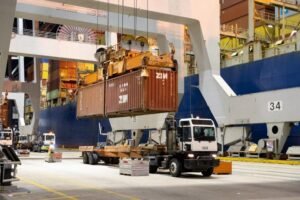The Union Minister Piyush Goyal on Saturday released the LEADS (Logistics Ease Across Different States) 2023 report, recognizing 11 states and two Union Territories as ‘Achievers’ which includes coastal states like Andhra Pradesh, Gujarat, Karnataka, Tamil Nadu and landlocked states such as Haryana, Punjab, Telangana, Uttar Pradesh among others.
Notably, Maharashtra shifted from ‘Achievers’ to ‘Fast Movers’ in the Coastal Group while Odisha moved from ‘Achievers’ to ‘Aspirers’ in the report prepared by the Union Commerce & Industry Ministry.
Categories in the Logistics Report
The Coastal Group features Kerala and Maharashtra as ‘Fast Movers,’ while landlocked states are Madhya Pradesh, Rajasthan, Uttarakhand, and North Eastern states Arunachal Pradesh, Nagaland, while Andaman & Nicobar, Lakshadweep, Puducherry lead among Union Territories in this category.
The ‘Aspirers’ category includes states like Goa, Odisha, West Bengal, and landlocked states such as Bihar, Chhattisgarh, Himachal Pradesh, Jharkhand along with North Eastern states Manipur, Meghalaya, Mizoram. Union Territories Daman & Diu, Dadra & Nagar Haveli, Jammu & Kashmir, Ladakh are also classified as ‘Aspirers.’
LEADS Report; akin to World Bank’s Report
LEADS Report initiated in 2018 is akin to the World Bank’s Logistics Performance Index (LPI) has evolved and now the 5th edition, LEADS 2023, provides insights into the improvement in logistics performance at the State and UT level.
The LEADS initiative aims to enhance the domestic performance to contribute to the overall competitiveness of the Indian logistics ecosystem. The report notes a 6 place improvement in India’s LPI rank to 38th position in 2023 which reflects a positive shift in Logistics Infrastructure, Services, and Operating and Regulatory Environment.

Based on a nationwide primary survey conducted between May and July 2023 covering 7,300 responses across 36 States/UTs, and over 750 stakeholder consultations facilitated by various associations, the report intends to instil healthy competition among States/UTs for improved performance.
Sumita Dawra who is a Special Secretary at DPIIT, highlighted the cooperative and consultative approach in creating the report, ensuring an impartial evaluation of infrastructure and reforms. She noted that 23 states and Union Territories synchronized their State Logistics Policies with the National Logistics Policy. Additionally, 16 states and Union Territories bestowed industry status upon the logistics sector
It has also been stated by reports and authorities that the increase in India’s position on the LPI is attributable to the increased digitization that India has witnessed in the recent years. Advancements in technology makes the Logistics process faster.
The National Logistics Policy of India introduced on September 17, 2022 seeks to lower the expenses within the country.

India’s Logistics Sector
The logistics sector plays a crucial role in India’s trade managing approximately 95% of the country’s total trade by volume and 70% by value. Beyond its role in trade facilitation, the industry is a major contributor to employment in India, currently providing jobs for about 22 million people.
Projections indicate a substantial growth in employment within the sector with an anticipated increase to 40 million jobs by the year 2030. This underscores the sector’s significance not only in facilitating economic activities but also in serving as a key driver of employment and potential economic growth in the coming years.










